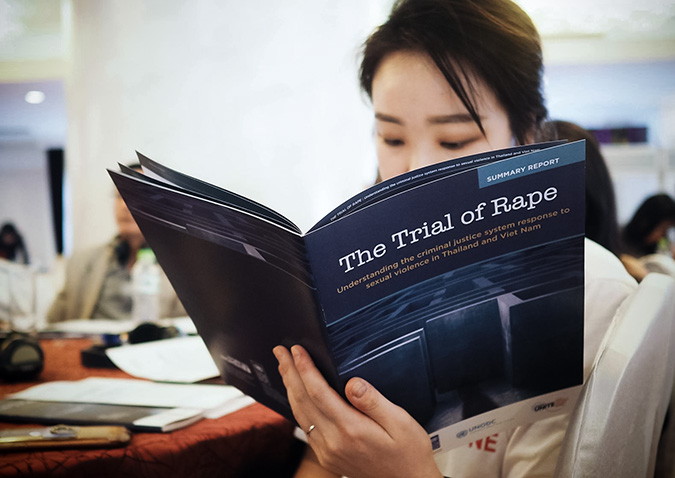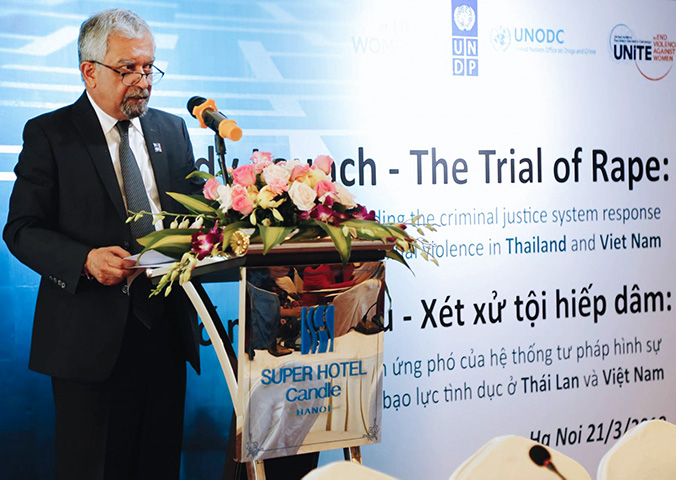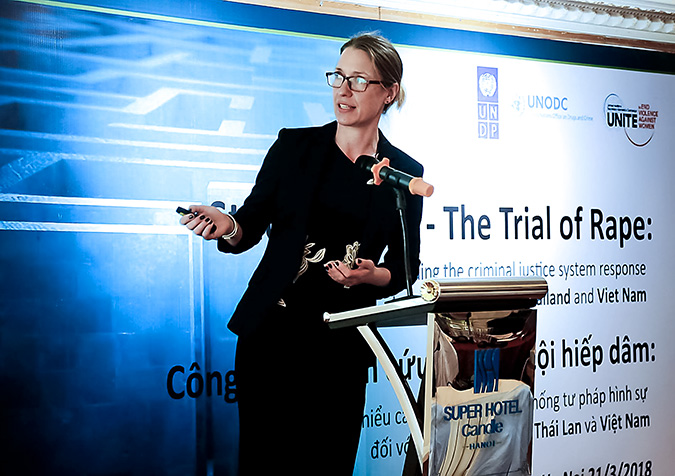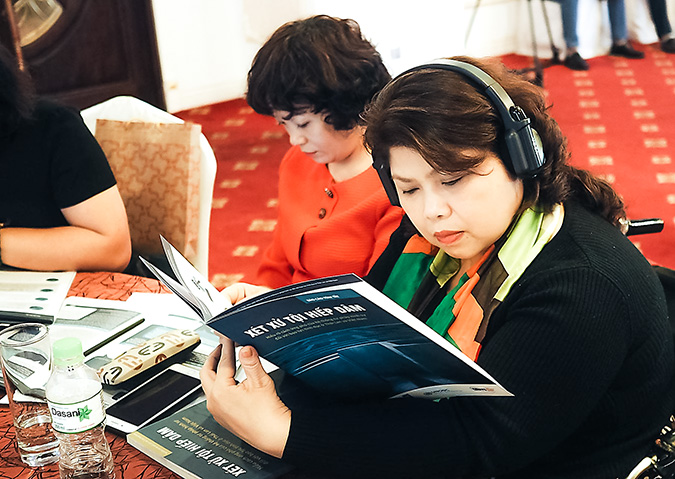UN study sheds new light on discrimination against rape victims
The Trial of Rape study launch in Viet NamDate:

Joint Press Release
For immediate release
Ha Noi, Viet Nam — The majority of victims of sexual assault in Thailand and Viet Nam face serious challenges in obtaining justice, and this is in part due to discriminatory attitudes and practices which discouraged, dismissed and disempowered them at every step in the justice process; from the initial reporting to trial, a new United Nations study has found.

The findings of the study 'The Trial of Rape: Understanding the Criminal Justice System Response to Sexual Violence in Thailand and Viet Nam,' were shared at a workshop jointly held in Ha Noi on 21 March by the United Nations Entity for Gender Equality and the Empowerment of Women (UN Women), UN Development Programme (UNDP) and UN Office on Drugs and Crime (UNODC). The study is the first such comparative study in the Asia-Pacific region.

In his opening remarks, Mr Kamal Malhotra, UN Resident Coordinator in Viet Nam, emphasized that institutional responses to violence against women need to be tailored to the particular and diverse needs and priorities of women and girls. "Along with efforts to prevent violence in the first place, the justice sector's response will be critical to ending the cycle of violence. It needs to send out a clear and unequivocal message that any violence against women and girls is unacceptable," Mr Malhotra said. "Justice providers play a vital role in keeping women and girls safe, and holding perpetrators accountable," he noted.
The study analysed how the criminal justice systems in both countries respond to reported cases of rape and sexual assault of women. In total, the researchers reviewed 290 police or court case files and interviewed 213 people including government officials, judicial personnel, civil society activists, and providers of services to survivors.
The study focused on better understanding of the reasons for attrition-the process by which cases fail to proceed through the justice system, from the stage of filing the initial complaint, through investigations, to the decision whether to prosecute, and finally to the trial stage. It found that sexual assault survivors face significant societal, legal, and institutional barriers in policies and practices which contribute to high attrition rates. These include stereotypes about sexual assaults and how survivors are expected to look and behave, the informal settlements of complaints, frequent insensitive treatment of victims, and prolonged court proceedings which are often not sensitive to the traumatic experiences that sexual assault survivors endure.

Anna-Karin Jatfors, Deputy Regional Director of UN Women's Regional Office for Asia and the Pacific, who presented the report, said: "The study found that there are pervasive barriers to justice for survivors of sexual assault that stem from not only difficulties in getting assistance, but also in the attitudes and biases of the police and justice officials tasked with providing assistance. Understanding what the barriers to justice are is a crucial first step to delivering justice to women and ending the widespread impunity in sexual violence. We hope this study will become an entry point for change in both countries."
Nick Booth, UNDP's regional Programme Advisor on Governance, Conflict Prevention, Access to Justice and Human Rights, said: "Sexual violence is one of the most serious human rights violations women face, and it must be a priority for justice systems. This study highlights the limitations in referral networks and coordination mechanisms within the justice system, and with health and social welfare services, which prevent survivors of sexual violence getting the justice they deserve. Joined-up justice services are essential to overcome the challenge of impunity."
The findings of this study reveal that the main factors in reported cases of rape contradict numerous commonly held myths and beliefs about rape. While there is a myth that 'real rape' involves strangers, force, physical injury and occurs in public, 86 per cent of victims reported knowing the suspect and 76 per cent of victims had no visible signs of injury in Viet Nam. These findings have important implications for how justice systems handle sexual crimes and interact with victims of sexual violence.
A key strength of the study is the substantial engagement from the Governments of Thailand and Viet Nam in the research, which improves our shared understanding of the barriers in the administration of justice, and where to focus efforts to address them.
Snapshots of key findings from the research, are as follows:
Social factors that impact women's access to justice and influence attrition: There is wide acceptance of myths about women and girls, and how incidents of sexual assault and rape occur, which interfere in women's and girls' ability to seek justice and have their cases taken seriously. Examples of these myths include:
Myth: 'Real rape' involves strangers, force, physical injury and occurs in public.
Finding: Most victims and suspects of sexual crimes know each other. The majority of cases reviewed had no documentation of physical injury, and the majority of reported sexual assaults happen in homes or hotels.
Myth: Rape and sexual violence are only a problem when it happens to 'good' or 'innocent' women and girls.
Finding: While rape can happen to anyone, the study found that many criminal justice providers hold beliefs about the 'ideal' sexual assault victim. For example, the 'ideal victim' should demonstrate intense fear, helplessness, horror or strong emotions. Victims who recount their experiences in a cold or detached manner do not fit the idea of appropriate behavior, and therefore their stories are not seen as credible.
Myth: Some women deserve to be raped and sexually assaulted; it is their own fault.
Finding: Women were often blamed for the sexual violence they suffered. Reasons for this range from being thought to be a 'sex worker', to dressing provocatively, going out in the evening with a man, or being alone on a bus at night.
Legal and procedural factors relating to criminal procedural processes and their impact on attrition: In both countries, attrition occurred at all stages of the criminal justice process - reporting/initial contact stage; investigation stage; pre-trial stage; and trial stage. From the case file analysis, the research found victims were often made to repeat their stories multiple times, a process which can be humiliating, [and] exacerbate her trauma - and this can increase the likelihood of attrition. In turn, barriers such as these inhibit the reporting of sexual violence, and reduce the likelihood that a woman will persist in seeking redress through the criminal justice system.
Based on the findings, the report makes 9 priority recommendations to improve the situation. The report recommends that Viet Nam should establish quality essential justice services for victims that prioritize their protection and support. In addition, promoting an integrated and coordinated criminal justice, government and civil society response is critical.

Media Inquiries:
Hoang Bich Thao
UN Women | phone: 84-24-38500376 | Email: [ Click to reveal ]
Nguyen Viet Lan
UNDP | phone: 84-24-38500158 | Email: [ Click to reveal ]
Note to Editors:
* Victims used in the full report, the summary or in the press release irrespective of the outcome of the case, so includes complainants. Victim means a person recorded as the victim of sexual offence, including those cases subsequently deemed no offence or false allegations. The term "victim" is used as this is the common terminology for analysis of criminal justice data and is not intended to negate other terms such as "survivors".
About UN Women
UN Women, or the United Nations Entity for Gender Equality and the Empowerment of Women, works to eliminate discrimination against women and girls, to empower women, and to achieve equality between women and men.
About UNDP
UNDP connects countries to knowledge, experience and resources so people can build a better life. It helps countries attract foreign aid and use it effectively. In all its activities, UNDP promotes gender equality and human rights.
About UNODC
UNODC is a global leader in the fight against illicit drugs and crime. UNODC integrates a gender perspective in its work, particularly in its projects to provide alternative livelihoods and to stop human trafficking.
About UNiTE Campaign
In support of this civil society initiative, each year, the United Nations Secretary-General's campaign UNiTE to End Violence against Women (UNiTE) calls for global action to increase worldwide awareness and create opportunities for discussion about challenges and solutions of ending violence against women. UNiTE is an UN interagency campaign, with UN Women as the coordinating agency. In 2010, UNiTE Campaign launched the regional campaign in the Asia-Pacific region. In recent years, the UNiTE campaign has utilized the colour orange as a unifying theme running through all of its global activities. Orange is one of the official colours of the UNiTE campaign, as conceptualised by the Asia-Pacific UNiTE Youth Network. In the context of its global advocacy, the orange colour used as a symbol of a brighter future without violence against women and girls.

THÔNG CÁO BÁO CHÍ
Nghiên cứu của Liên Hợp Quốc cho thấy nạn nhân hiếp dâm bị phân biệt đối xử
Công bố Nghiên cứu "Xét xử tội hiếp Dâm" tại Việt Nam
21 tháng 3 năm 2018
Hà Nội, ngày — Một nghiên cứu mới được công bố của Liên Hợp Quốc đã chỉ ra rằng phần lớn các nạn nhân bị hãm hiếp ở Thái Lan và Việt Nam đều phải đối mặt với nhiều khó khăn và thách thức trong việc tiếp cận công lý, một phần là do thái độ và hành vi phân biệt đối xử. Những khó khăn và thách thức này khiến các nạn nhân cảm thấy nản lòng, không được tiếp cận pháp lý và không được hỗ trợ ở mọi giai đoạn của quá trình xét xử, từ khâu trình báo ban đầu cho đến phiên tòa xét xử.

Những phát hiện chính trong nghiên cứu: "Xét xử tội hiếp dâm: Hiểu rõ cách ứng phó của hệ thống tư pháp hình sự đối với bạo lực tình dục ở Thái Lan và Việt Nam" được chia sẻ trong một hội thảo tại Hà Nội ngày 21 tháng 3 do Cơ quan Liên Hợp Quốc về bình đẳng giới và trao quyền cho phụ nữ (UN Women) cùng với Chương trình Phát triển của Liên Hợp Quốc (UNDP), Cơ quan Phòng chống Ma túy và Tội phạm của Liên Hợp Quốc (UNODC) tổ chức. Đây là nghiên cứu so sánh đầu tiên được thực hiện tại khu vực Châu Á-Thái Bình Dương.

Phát biểu khai mạc hội thảo, ông Kamal Malhotra, Điều phối viên thường trú Liên hợp quốc tại Việt Nam, nhấn mạnh rằng chính sách và ứng phó của cơ quan nhà nước đối với bạo lực đối với phụ nữ cần được điều chỉnh cho phù hợp với những nhu cầu, những ưu tiên cụ thể và đa dạng của phụ nữ và trẻ em gái.
Ông Malhotra nói: "Cùng với những nỗ lực để ngăn chặn ngay bạo lực, các hoạt động ứng phó của ngành tư pháp là vô cùng quan trọng để có thể chấm dứt chu kỳ bạo lực. Cần truyền tải một thông điệp rõ ràng rằng bất kỳ hành động bạo lực đối với phụ nữ và trẻ em gái nào cũng đều không thể chấp nhận được. Các nhà cung cấp dịch vụ tư pháp có vai trò quan trọng trong việc bảo vệ sự an toàn cho phụ nữ và trẻ em gái và buộc thủ phạm phải chịu trách nhiệm về hành vi của mình.
Báo cáo nghiên cứu đã phân tích cách thức các hệ thống tư pháp hình sự tại Thái Lan và Việt Nam ứng phó với những trường hợp hiếp dâm và tấn công tình dục của phụ nữ. Cụ thể, nhóm nghiên cứu đã rà soát tổng cộng 290 hồ sơ vụ án của cảnh sát hoặc toà án và phỏng vấn 213 người bao gồm các quan chức chính phủ, nhân viên tư pháp, các nhà hoạt động xã hội dân sự và các nhà cung cấp dịch vụ cho những nạn nhân sống sót.

Nghiên cứu tập trung để hiểu rõ hơn nguyên nhân dẫ đến bỏ cuộc giữa chừng trong quá trình đi tìm công lý của các nạn nhân - quá trình mà các vụ án không được giải quyết thông qua hệ thống tư pháp, từ giai đoạn nộp đơn khiếu nại ban đầu, điều tra, quyết định truy tố và cuối cùng đến giai đoạn xét xử. Nghiên cứu phát hiện ra rằng những nạn nhân bị hãm hiếp phải đối mặt với nhiều rào cản lớn về chính sách và thực tiễn về mặt xã hội, pháp lý và thể chế. Đó là những rào cản về định kiến và khuôn mẫu đối với chính nạn nhân và kẻ được cho là thủ phạm, rằng họ phải hành xử như thế nào, rào cản trong việc giải quyết khiếu nại không chính thức, trong cách ứng xử thiếu sự đồng cảm với nạn nhân, và thủ tục tố tụng tòa kéo dài, thường không nhạy cảm với những trải nghiệm, thương trấn tâm lý mà nạn nhân bị hãm hiếp phải chịu đựng.
Nick Booth, UNDP's regional Programme Advisor on Governance, Conflict Prevention, Access to Justice and Human Rights, said: "Sexual violence is one of the most serious human rights violations women face, and it must be a priority for justice systems. This study highlights the limitations in referral networks and coordination mechanisms within the justice system, and with health and social welfare services, which prevent survivors of sexual violence getting the justice they deserve. Joined-up justice services are essential to overcome the challenge of impunity."
Bà Anna-Karin Jatfors, Phó Giám đốc UN Women khu vực Châu Á-Thái Bình Dương, người trình bày báo cáo tại hội thảo, nói: "Nghiên cứu cho thấy có những rào cản phổ biến trong việc tiếp cận công lý mà những nạn nhân bị xâm hại tình dục đang gặp phải không chỉ là những khó khăn trong việc nhận được sự trợ giúp, mà còn ở thái độ và sự phân biệt đối xử của cảnh sát và các quan chức tư pháp được giao nhiệm vụ hỗ trợ. Hiểu được những rào cản đối với công lý sẽ là bước đầu quan trọng để đảm bảo công lý cho phụ nữ và chấm dứt tình trạng vụ án bạo lực tình dục không được xử lý một cách công bằng. Chúng tôi hy vọng nghiên cứu này sẽ là khởi đầu cho sự thay đổi ở cả hai nước ".
Ông Nick Booth, Cố vấn của UNDP tại khu vực Châu Á - Thái Bình Dương về Quản trị công, Phòng ngưà xung đột, Tiếp cận công lý và Thúc đẩy nhân quyền, khẳng định: "Bạo lực tình dục là một trong những hành vi vi phạm nhân quyền nghiêm trọng nhất mà phụ nữ phải đối mặt, và vấn đề này cần được ưu tiên trong hệ thống pháp luật. Nghiên cứu này làm nổi bật những hạn chế trong các cơ chế chuyển tuyến và phối hợp của hệ thống pháp luật, cũng như trong các dịch vụ chăm sóc sức khoẻ và phúc lợi xã hội giúp ngăn ngừa bạo lực tình dục và đảm bảo nạn nhân nhận được sự công bằng mà họ xứng đáng. Các dịch vụ pháp luật tích hợp là thực sự cần thiết để khiến cho những thủ phạm hiếp dâm bị trừng phạt thích đáng."
Các phát hiện của nghiên cứu chỉ ra nhiều yếu tố chính trong các vụ án hiếp dâm trái ngược hoàn toàn với các quan niệm sai lầm phổ biến về hãm hiếp. Theo quan niệm thì các vụ hãm hiếp thường do người lạ, gây thương tích và xảy ra ở nơi công cộng, nhưng trên thực tế ở Việt Nam 86% nạn nhân được hỏi nói rằng họ biết người bị tình nghi là thủ phạm và 76% nạn nhân không có dấu hiệu thương tích rõ rệt. Những phát hiện này có ý nghĩa quan trọng đối với cách các hệ thống pháp lý xử lý các tội phạm liên quan đến tình dục và tương tác với các nạn nhân bị bạo lực tình dục.
Một trong những điểm mạnh của Nghiên cứu là sự tham gia của Chính phủ Thái Lan và Việt Nam trong việc nghiên cứu sẽ giúp nâng cao hiểu biết chung của mọi người về những rào cản về công lý, cũng như để tập trung nỗ lực giải quyết các vấn đề đang tồn tại.
Tóm tắt các phát hiện chính từ nghiên cứu:
Những yếu tố xã hội tác động tới khả năng tiếp cận công lý của phụ nữ và dẫn tới tình trạng bỏ cuộc: Hiện vẫn đang tồn tại những quan niệm không đúng về phụ nữ và trẻ em gái, về bạo lực tình dục, ảnh hướng đến khả năng tiếp cận công lý của phụ nữ và trẻ em gái, đặc biệt ảnh hướng đến việc liệu vụ án của họ có được giải quyết một cách nghiêm túc. Những quan niệm không đúng đó bao gồm:
- Quan niệm không đúng: 'Hiếp dâm thực sự' do người lạ gây ra, có sử dụng vũ lực, và có thương tích cơ thể và xảy ra ở nơi công cộng
- Phát hiện nghiên cứu: Trong đa số các trường hợp, nạn nhân và nghi phạm quen biết nhau. Đa số các vụ việc không được lưu hồ sơ hoặc tài liệu hóa ghi nhận về thương tích về thể chất và xảy ra tại những nơi riêng tư.
- Quan niệm không đúng: Hiếp dâm và bạo lực tình dục chỉ là vấn đề khi nó xảy ra với những phụ nữ và trẻ em gái 'ngoan' hoặc 'trong trắng'
- Phát hiện nghiên cứu: Mặc dù bất cứ ai cũng có thể bị hiếp dâm, thì nghiên cứu cho thấy một số cán bộ làm công tác tư pháp ở cả hai nước có quan niệm cỗ hữu về việc thế nào mới được coi là nạn nhân hiếp dâm. Ví dụ, họ cho rằng nạn nhân phải thể hiện sự sợ hãi, bất lực hoặc những phản ứng cảm xúc mạnh mẽ. Những nạn nhân kể lại kinh nghiệm của họ một cách bình tĩnh được cho là không đáng tin cậy.
- Quan niệm không đúng: Một số phụ nữ đáng bị hiếp dâm và tấn công tình dục; Đó là lỗi của họ
- Phát hiện nghiên cứu: phụ nữ thường bị đổ lỗi vì những lý do khác nhau, từ việc họ làm gái mại dâm, đến ăn mặc khiêu khích, đi chơi khuya với đàn ông, hoặc thậm chí chỉ là đi xe buýt một mình vào ban đêm.
Những yếu tố pháp luật và thể chế ảnh hưởng tới tình trạng bỏ cuộc:
- Ở hai quốc gia, việc bỏ cuộc diễn ra ở tất cả các giai đoạn của quy trình tố tụng hình sự - giai đoạn trình báo ban đầu, giai đoạn điều tra, giai đoạn trước khi xét xử, và giai đoạn xét xử.
- Từ phân tích hồ sơ vụ án, nghiên cứu này cũng cho thấy các nạn nhân thường phải kể đi kể lại vụ việc nhiều lần, điều này khiến cho họ cảm thấy bị làm nhục và làm trầm trọng thêm những sang chấn về tâm lý - và tăng thêm khả năng muốn bỏ cuộc của nạn nhân. Và như vậy, các rào cản này ngăn chặn nạn nhân báo cáo và quyết tâm theo đuổi quá trình tố tụng hình sự.
Dựa trên những phát hiện này, báo cáo đưa ra chín khuyến nghị ưu tiên để cải thiện tình hình. Báo cáo khuyến nghị Việt Nam cần thiết lập dịch vụ tư pháp thiết yếu và có chất lượng cho nạn nhân, ưu tiên việc bảo vệ và hỗ trợ họ. Ngoài ra, cần thúc đẩy hoạt động ứng phó tích hợp và có điều phối giữa ngành tư pháp hình sự, chính phủ và xã hội dân sự.

Liên hệ báo chí:
Hoàng Bích Thảo
Cán bộ truyền thông UN Women | phone: 84-24-38500376 | Email: [ Click to reveal ]
Nguyễn Việt Lan
Cán bộ truyền thông UNDP | phone: 84-24-38500158 | Email: [ Click to reveal ]
Note to Editors:
* Victims used in the full report, the summary or in the press release irrespective of the outcome of the case, so includes complainants. Victim means a person recorded as the victim of sexual offence, including those cases subsequently deemed no offence or false allegations. The term "victim" is used as this is the common terminology for analysis of criminal justice data and is not intended to negate other terms such as "survivors".
About UN Women
UN Women, or the United Nations Entity for Gender Equality and the Empowerment of Women, works to eliminate discrimination against women and girls, to empower women, and to achieve equality between women and men.
About UNDP
UNDP connects countries to knowledge, experience and resources so people can build a better life. It helps countries attract foreign aid and use it effectively. In all its activities, UNDP promotes gender equality and human rights.
About UNODC
UNODC is a global leader in the fight against illicit drugs and crime. UNODC integrates a gender perspective in its work, particularly in its projects to provide alternative livelihoods and to stop human trafficking.
About UNiTE Campaign
In support of this civil society initiative, each year, the United Nations Secretary-General's campaign UNiTE to End Violence against Women (UNiTE) calls for global action to increase worldwide awareness and create opportunities for discussion about challenges and solutions of ending violence against women. UNiTE is an UN interagency campaign, with UN Women as the coordinating agency. In 2010, UNiTE Campaign launched the regional campaign in the Asia-Pacific region. In recent years, the UNiTE campaign has utilized the colour orange as a unifying theme running through all of its global activities. Orange is one of the official colours of the UNiTE campaign, as conceptualised by the Asia-Pacific UNiTE Youth Network. In the context of its global advocacy, the orange colour used as a symbol of a brighter future without violence against women and girls.